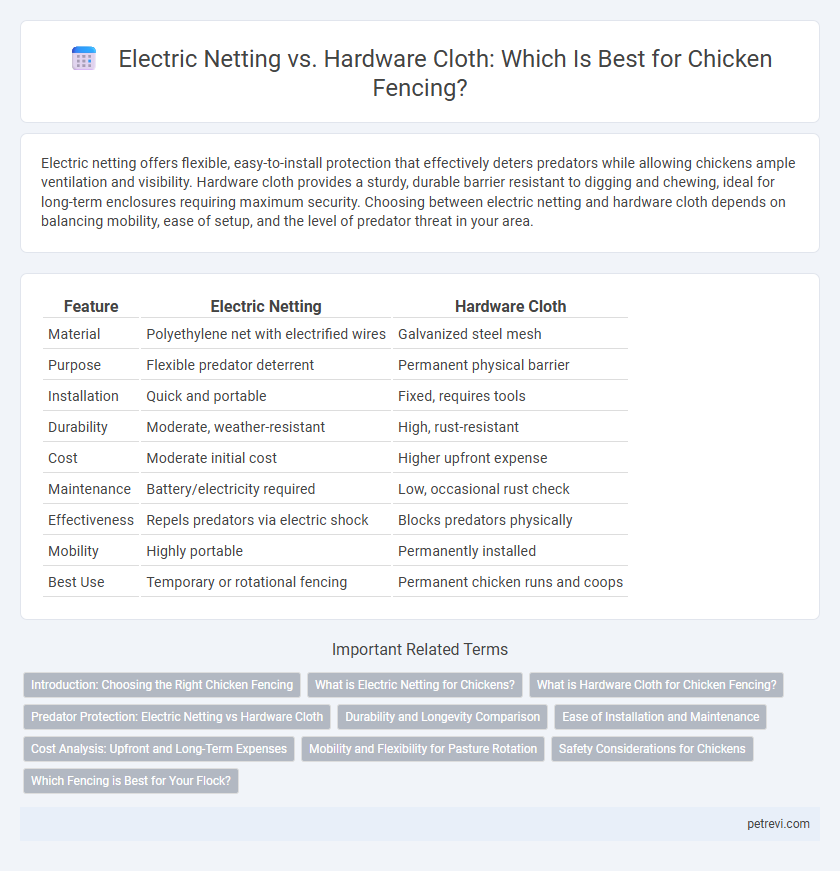Electric netting offers flexible, easy-to-install protection that effectively deters predators while allowing chickens ample ventilation and visibility. Hardware cloth provides a sturdy, durable barrier resistant to digging and chewing, ideal for long-term enclosures requiring maximum security. Choosing between electric netting and hardware cloth depends on balancing mobility, ease of setup, and the level of predator threat in your area.
Table of Comparison
| Feature | Electric Netting | Hardware Cloth |
|---|---|---|
| Material | Polyethylene net with electrified wires | Galvanized steel mesh |
| Purpose | Flexible predator deterrent | Permanent physical barrier |
| Installation | Quick and portable | Fixed, requires tools |
| Durability | Moderate, weather-resistant | High, rust-resistant |
| Cost | Moderate initial cost | Higher upfront expense |
| Maintenance | Battery/electricity required | Low, occasional rust check |
| Effectiveness | Repels predators via electric shock | Blocks predators physically |
| Mobility | Highly portable | Permanently installed |
| Best Use | Temporary or rotational fencing | Permanent chicken runs and coops |
Introduction: Choosing the Right Chicken Fencing
Electric netting offers lightweight, flexible protection with easy installation and portability, ideal for rotational grazing and temporary chicken enclosures. Hardware cloth provides durable, predator-resistant fencing with a rigid structure, ensuring long-term security against raccoons, foxes, and snakes. Selecting the appropriate fencing depends on balancing mobility needs with predator threat levels and budget constraints.
What is Electric Netting for Chickens?
Electric netting for chickens is a flexible, lightweight fence made from electrified wires woven into a net-like structure, designed to contain poultry while deterring predators. It provides a strong electric pulse that discourages animals from breaching the enclosure, making it ideal for temporary or movable chicken coops. Compared to hardware cloth, electric netting offers easier installation and portability without compromising security.
What is Hardware Cloth for Chicken Fencing?
Hardware cloth for chicken fencing is a durable, welded wire mesh typically made from galvanized steel, designed to protect poultry from predators and contain chickens within designated areas. Its small, uniform grid size prevents animals like raccoons, snakes, and foxes from penetrating the fence, offering superior security compared to electric netting. This rigid structure is ideal for permanent or semi-permanent enclosures, ensuring long-lasting protection and stability around chicken coops and runs.
Predator Protection: Electric Netting vs Hardware Cloth
Electric netting provides a dynamic barrier with an electric charge that deters predators such as foxes, raccoons, and coyotes by delivering a mild shock upon contact, making it highly effective for temporary or movable chicken fencing. Hardware cloth consists of rigid galvanized steel mesh with small openings that physically block predators from entering, offering a durable and permanent solution resistant to digging and clawing. For maximum predator protection, combining hardware cloth at the base with electric netting on top creates a comprehensive defense against a wide range of threats.
Durability and Longevity Comparison
Electric netting offers flexibility and quick setup, but hardware cloth provides superior durability and longevity for chicken fencing due to its rigid galvanized steel construction. Hardware cloth resists weathering, rust, and predator attacks more effectively than electric netting, which can degrade from UV exposure and require frequent maintenance. Investing in hardware cloth ensures a long-lasting, secure enclosure that withstands harsh environmental conditions and persistent wildlife threats.
Ease of Installation and Maintenance
Electric netting for chicken fencing offers quick and straightforward installation, making it ideal for temporary or movable enclosures. Hardware cloth requires more time and effort to install due to its rigid structure but provides long-term durability and resistance to predators. Maintenance of electric netting involves regular tension checks and battery replacements, while hardware cloth primarily needs periodic rust inspections and repairs for bent or broken sections.
Cost Analysis: Upfront and Long-Term Expenses
Electric netting offers a lower upfront cost averaging $100 to $200 for 50 feet compared to hardware cloth, which ranges from $150 to $300 per 50 feet. Long-term expenses for electric netting can include battery or solar panel replacements and occasional repairs, potentially increasing total costs over five years by 20-30%. Hardware cloth requires minimal maintenance and can last over 10 years, making it more cost-effective in the long run despite higher initial investment.
Mobility and Flexibility for Pasture Rotation
Electric netting offers superior mobility and flexibility for pasture rotation, allowing chicken owners to easily move and adjust fencing as flocks graze different areas. Hardware cloth provides a sturdy, permanent barrier but lacks the adaptability needed for frequent relocation, making it less practical for dynamic pasture management. For effective rotational grazing, electric netting enhances pasture utilization while maintaining secure containment.
Safety Considerations for Chickens
Electric netting offers flexible and quick installation for chicken fencing, providing effective predator deterrence with minimal injury risk due to its low-voltage electric pulses. Hardware cloth, made from galvanized steel wire mesh, ensures a robust physical barrier that prevents predators like raccoons and foxes from entering but poses a potential entrapment hazard if the mesh size is too large or edges are not properly secured. Prioritizing safety, hardware cloth should have small mesh sizes (1/2 inch or less) and be installed with careful attention to securing sharp edges, while electric netting requires regular voltage checks to maintain safe but effective protection for chickens.
Which Fencing is Best for Your Flock?
Electric netting for chicken fencing offers flexible, lightweight protection that can be easily moved and expanded, effectively deterring predators with electric pulses. Hardware cloth provides a durable, rigid barrier with small mesh sizes that prevent even the smallest predators from entering, ensuring long-term security. Choosing the best fencing for your flock depends on predator pressure, ease of installation, and whether you prioritize mobility or permanent protection.
Electric Netting vs Hardware Cloth for Chicken Fencing Infographic

 petrevi.com
petrevi.com